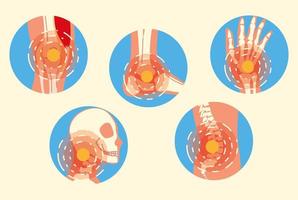Joint replacement surgery becomes necessary when a person’s joint becomes severely damaged or deteriorated, leading to chronic pain, loss of mobility, and decreased quality of life.
Several factors can contribute to the need for joint replacement surgery:
- Osteoarthritis: Osteoarthritis is the most common reason for joint replacement surgery. It occurs when the cartilage that cushions the ends of bones within the joint deteriorates over time, leading to pain, stiffness, and decreased joint function. As osteoarthritis progresses, the joint becomes increasingly damaged, eventually necessitating joint replacement surgery to relieve pain and restore mobility.
- Rheumatoid Arthritis: Rheumatoid arthritis is a chronic autoimmune disease that causes inflammation of the joints, leading to pain, swelling, and eventually joint damage. Over time, rheumatoid arthritis can erode the cartilage and bone within the joint, resulting in severe pain and disability. When conservative treatments fail to adequately control symptoms, joint replacement surgery may be recommended to improve joint function and quality of life.
- Traumatic Injury: Traumatic injuries, such as fractures or severe ligament tears, can damage the structures within a joint and disrupt its normal function. Despite appropriate medical treatment and rehabilitation, some individuals may experience persistent pain and instability in the affected joint. In such cases, joint replacement surgery may be necessary to repair or replace damaged joint surfaces and restore stability and function.
- Avascular Necrosis: Avascular necrosis, also known as osteonecrosis, occurs when the blood supply to a bone is disrupted, leading to bone death and collapse of the affected joint. Avascular necrosis can result from conditions such as trauma, prolonged steroid use, or certain medical conditions. When avascular necrosis affects weight-bearing joints like the hip or knee, joint replacement surgery may be required to alleviate pain and restore joint function.
- Other Degenerative Joint Diseases: Various degenerative joint diseases, such as post-traumatic arthritis, hip dysplasia, or congenital joint abnormalities, can contribute to joint degeneration and the eventual need for joint replacement surgery. These conditions may result from genetic factors, developmental abnormalities, or previous joint injuries, leading to progressive joint damage over time.
- Failed Previous Surgeries: In some cases, previous joint surgeries, such as arthroscopy or ligament repair, may fail to provide lasting relief from joint pain and dysfunction. When conservative treatment options have been exhausted, and the joint remains significantly impaired, revision joint replacement surgery may be necessary to correct previous surgical failures and restore function.
Ultimately, the decision to undergo joint replacement surgery is based on a thorough evaluation of the individual’s medical history, symptoms, functional limitations, and response to conservative treatments. Joint replacement surgery aims to alleviate pain, improve joint function, and enhance quality of life for individuals suffering from severe joint conditions that have not responded to non-surgical interventions.






Comments